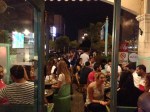As a rule of thumb in the Lebanese political scene, you should know you’re doing something right when all kinds of political groups from all across the political spectrum rally against you and fight you in the dirtiest of ways, slogans and rhetorics.
The “Byerte” list, translating to the Beirutis List, with its slogan “Keep Beirut For Its People” was Hariri and the political establishment’s choice for the upcoming municipal elections on May 8th. Of course, the slogan “Keep Beirut For Its People” is nothing more than a simple variation of the equally xenophobic, horrific political rhetoric rising around the world today, championed by people like Donald Trump. If they had the audacity, they might as well run with “Make Beirut Great Again” and be done with it.
The fact of the matter is no area in the country is exclusive to “its people,” and certainly not the capital which houses 50% of the Lebanese population.
Of course, those politicians had no problem with making sure all investment is placed in Beirut only while forgetting other regions entirely. Those politicians had no problem spending billions of dollars in post war restoration that belonged to the whole country to rebuild Beirut’s heart, making it heartless in the process.
They also had no problem in entertaining the idea of taking Beirut’s trash to places like Akkar. Clearly, keeping Beirut for Beirutis does not extend to their garbage.
Those politicians had no problem as well in championing policies over years to make Beirut not remotely affordable to its own people, unless we now have plans to nationalize GCC citizens.
Those politicians had no problem in making sure Beirut sunk in garbage and stunk of its smell, of its streets being the scene of fights and death that happened not even 8 years ago – ironically on the day the elections are supposed to happen.
I can go on and on, but the epitome of it all is in the fact that Hariri isn’t from Beirut to begin with. Say hi to Saida for me, why don’t you?
Horrifying slogans aside, the Future Movement and the rest of political groups in that list are rallying people in the only way they know how: fear and sectarianism.
Behold a Hariri supporter’s latest magnum opus on Facebook:
It’s precisely rhetoric like this that shows how despicable and afraid those in governance can get, in order to instill this sense of fear and hatred in those who support them, by getting them to fabricate silly, redundant and baseless arguments in order to main a status quo that just doesn’t work.
Omar Chebaro is not alone. Many Beiruti Sunnis as well as other sects or party enthusiasts entertain the notion that opposing Hariri’s list would be unwise simply because it means falling out of rank at a time when doing so is not in the better interest of their sect. What I heard repeatedly goes along the lines: “you can’t be secular in a sectarian environment.”
This is not a justification to support Hariri’s list of “same old same old” at a time when people are dying, suffocating, and getting poisoned from that same old same old. It is in municipal elections that you can stand up to those who have taken you for granted and whose entire message is not one that’s based in the future but in a past rooted in bigotry and brainwashing.
Dear Beirutis, Sunni and otherwise, Beirut Madinati is not the list of Civil Marriage. A list running for Municipal Elections cannot enforce Civil Marriage, regardless of what its candidates believe regarding that issue.
Dear Beirutis, Sunni and otherwise, Beiruti Madinati will not set Beirut on the path to become a haven for sin. Walaw? Don’t be fooled by hateful messages whose only purpose is to get you to vote the way a party that has failed over and over and over again wants you to on May 8th.
Dear Beirutis, Sunni and otherwise, your vote on May 8th is really, very simple:
You can vote for trash. You can vote for the garbage filling your streets. You can vote for the smell that has made you vomit every day for the past 3 weeks. You can vote for the city in which you can’t afford to buy an apartment. You can vote for the city whose downtown you cannot even enter. You can vote for the roads congested with cars at any moment of any day. You can vote for poisoned water, poisoned food, poisoned air.
If you vote that way, you’d be voting for Beirut today, Beirut the city that is dying because of the policies of that who wants you to believe you have no other choice because you’re Sunni, or Orthodox, or from Beirut born and bred, keeping Beirut for its people, because its people are not all Lebanese.
Or you can vote to change things. You can vote to those who are not taking your vote for granted, but going to your neighborhood to ask you: what do you need? You can vote to those who have taken the time to write a 32 pages program for you, not someone asking you to vote for them just because you should.
On May 8th, the choice couldn’t really be simpler. I hope you choose those who are good, not those who make you afraid of wanting better.












